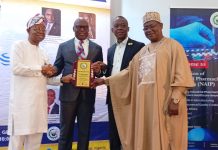The simmering tension which has long existed between pharmacists and medical practitioners in the country almost led to a heated debate between two renowned health professionals during the 2015 edition of Dortemag Ventures’ annual Infectious Disease Forum.
The interactive session which was jointly put together for healthcare practitioners by the company and its Malaysia-based partner, Kotra Pharmaceuticals, was held at Lagos Airport Hotel on 5 August, 2015.
Addressing the audience, Pharm. Cheah Min Loong, chief operating officer of Kotra Pharma gave a visual presentation, during which he made reference to the potency of generic products and the claim by some global companies that such products are inferior to innovator brands.
Some even allude that generics are produced in sub-standard facilities or that they usually take longer hours to produce result. There is quite a lot of misconception going on.
The chief operating officer of the Malaysia Pharmaceutical Company of the Year (2012) which equally has presence in 30 countries across Australia, Asia, Oceania, Africa, Middle East, Europe and South America further stressed that producing generics were not as cheap as had thought.
A recent bioequivalent study has proven that a generic antibiotic has similar rate and extent of bioavailability to the innovator product, and by extension, generic antibiotic will have similar efficacy and safety as innovator,” he disclosed.
Loong further reiterated that the GMP manufacturing process and quality control were valid, which should encourage Nigerian doctors to prescribe quality generic antibiotics without hassles.
However, while applauding the presentation of Mr Loong, Prof. Adebukunola Adefule-Ositele, a consultant with the department of ophthalmology, Lagos University Teaching Hospital (LUTH), declared that it was unfortunate that Nigerian pharmacists were not doing enough.
“Pharmacists in Nigeria are still sleeping and need to wake up from their slumber,” he admonished.”From the analysis we have just seen, we can tell that many researches and clinical trials had gone into this. Kotra Pharma has done well and remains a beacon for Malaysia…Nigerian pharmacists need to wake up. We need to do better than what we are presently doing.”
Apparently miffed by such insinuation of underperformance, pharmacists in the gathering were quick to express their disapproval.
Pharm. Mobolanle Adekoya, LUTH’s deputy director of pharmacy, was particularly vocal in her defence of pharmacists in the country.
“We are not sleeping! I would not sit here and listen to anybody disparage my profession,” she declared, adding that: “In LUTH Pharmacy where I work, we mix our syrup, mist mag, paracetamol, sodium chloride and our materials are sourced locally. We are not sleeping, I make bold to say hospital pharmacists are working. Even UCH in Ibadan works round the clock.”
Recalling how her 31-year exploits in pharmacy practice has seen her formulate products such as Vitamin A cream, KCL injection and sodium chloride in LUTH production unit, Adekoya emphasised that it would be unfair for anybody let alone a professional from the health sector to make pharmacists look like a lazy bunch.
Earlier in the forum, Dr Abieyuwa Emopkae, a consultant paediatrician and medical director of Massey Street Children Hospital, Lagos Island, had disclosed that diagnosis of infectious diseases was fast becoming a challenge in Nigeria.
One reason he adduced for this was what he described as poor management of microbiology laboratories.











